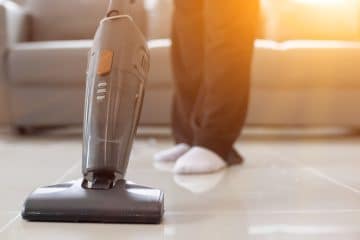Allergies are your body’s immune system’s response to a perceived threat, and they can make life unbearable. Symptoms like sneezing, runny nose, itchy eyes, and rashes can last weeks to months and can be particularly challenging to manage. Allergies, along with their symptoms, can be a major source of discomfort for many individuals. If you’re one of the millions of people affected by allergies, finding effective relief is crucial for improving your quality of life.
Thankfully, there are some straightforward ways to alleviate the symptoms of allergies without having to visit the doctor. Here are some easy ways to relieve allergy symptoms that you can try at home.
- 1. Stay Indoors on High-Pollen Days
- 2. Utilize An Air Purifier
- 3. Clean Your Home Regularly And Keep It Dust-Free
- 4. Use Allergy-Friendly Bedding
- 5. Practice Nasal Irrigation
- 6. Drink Herbal Tea
- 7. Take a Shower After Being Outdoors
- 8. Avoid Cigarette Smoke
- 9. Wear a Mask While Cleaning or Gardening
- 10. Manage Stress
- Wrap Up
1. Stay Indoors on High-Pollen Days
One of the most effective ways to reduce allergy symptoms is avoiding the allergens that cause them. If possible, stay indoors on days when pollen counts are high, especially during the early morning and early evening hours. You can check the local pollen count on a weather website or mobile app.
2. Utilize An Air Purifier
Improving the air quality inside your home can significantly reduce allergy symptoms. Utilize an air purifier with HEPA filter, like the Molekule air purifier, to remove airborne allergens. The Molekule air purifier utilizes innovative PECO (Photo Electrochemical Oxidation) technology, which effectively destroys allergens and other pollutants at a molecular level.
For more information, you can read a comprehensive Molekule review or other product review of similar brands. Overall, using an advanced purification system ensures cleaner and fresher air in your home, relieving allergy symptoms. Remember to regularly clean or replace the filters in your air purifier to maintain optimal performance.
3. Clean Your Home Regularly And Keep It Dust-Free
Pet dander, dust particles, and mold spores are common indoor allergens. To reduce your exposure to these allergens, clean your home regularly. Use a vacuum cleaner, preferably with a HEPA filter, as it helps trap small particles such as pollen, dust mites, and animal dander. Wash your bedding in hot water and use allergen-proof covers on your pillows and mattresses. Additionally, dust surfaces frequently using a damp cloth or electrostatic duster to prevent allergens from circulating in the air.

4. Use Allergy-Friendly Bedding
Your bed can be a breeding ground for allergens, such as dust mites. To create a more allergy-friendly sleeping environment, invest in an allergen-proof mattress and pillow covers. These specially designed covers create a barrier between you and allergens, reducing exposure while you sleep. Remember to wash your bedding regularly in hot water to remove allergens effectively.
5. Practice Nasal Irrigation
Nasal irrigation is a simple and effective technique that helps relieve nasal congestion and reduce allergens in the nasal passages. Use a saline solution and a nasal irrigation device to flush out irritants and mucus from your sinuses. This process can alleviate congestion, reduce sinus pressure, and temporarily relieve allergy symptoms. Ensure you use distilled or sterilized water and follow proper hygiene practices to prevent any potential infections.
6. Drink Herbal Tea
Many herbs have natural anti-inflammatory properties that can help reduce allergy symptoms. Try drinking herbal tea made from ginger, stinging nettle, or licorice root. These herbs have been used for centuries to relieve allergy symptoms and improve respiratory health.
7. Take a Shower After Being Outdoors
After spending time outdoors, pollen, dust, and other allergens can cling to your hair, skin, and clothing. Taking a shower can help wash away these allergens and reduce symptoms such as itching, sneezing, and congestion.
8. Avoid Cigarette Smoke
Cigarette smoke can worsen allergy symptoms as it irritates the lungs and throat. If you smoke, quit. If you’re around smokers, ask them to smoke outdoors or in a designated smoking area.
9. Wear a Mask While Cleaning or Gardening
Cleaning and gardening can stir up dust, pollen, and other allergens, making allergy symptoms worse. To reduce your exposure to these allergens, wear a mask while cleaning or gardening. Look for a mask labeled N95 or N100, which can filter out small particles such as allergens.
10. Manage Stress
Stress can exacerbate allergy symptoms, making them more difficult to manage. Utilizing stress management techniques in your daily routine can help alleviate symptoms and enhance your overall well-being. Finding ways to relax and unwind can have a positive impact on your allergies and overall health.
Wrap Up
Allergy symptoms can be incredibly frustrating to deal with, but they don’t have to be. By following these easy and practical tips, you can find relief from allergy symptoms and enjoy a more comfortable life. Remember, everyone’s allergies are unique, so it may take some experimentation to find the strategies that work best for you. However, with persistence and the right approach, you can reduce allergy symptoms and improve your quality of life significantly. If symptoms persist, it’s important to seek medical advice.

Isreal olabanji a dental assistant and public health professionals and has years of experience in assisting the dentist with all sorts of dental issues.
We regularly post timely and trustworthy medical information and news on Fitness, Dental care, Recipes, Child health, obstetrics, and more.
The content is intended to augment, not replace, information provided by your clinician. It is not intended nor implied to be a substitute for professional medical advice. Reading this information does not create or replace a doctor-patient relationship or consultation. If required, please contact your doctor or other health care provider to assist you to interpret any of this information, or in applying the information to your individual needs.

